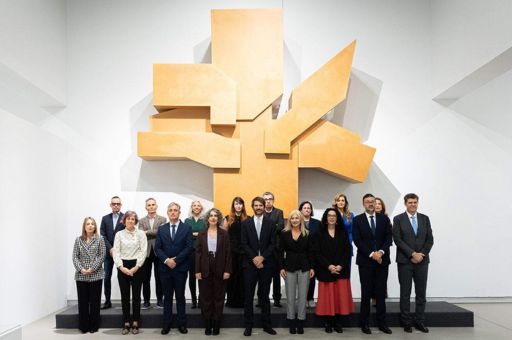The Minister of Culture, Ernest Urtasun, has reported on the preparations for the World Conference on Cultural Policies and Sustainable Development of the United Nations Educational, Scientific and Cultural Organisation (UNESCO) to be held in Barcelona in 2025.
Ernest Urtasun chaired the meeting of the plenary session of the Sectoral Conference on Culture at the Artium Museum of Contemporary Art of the Basque Country in Vitoria-Gasteiz, which was attended by the culture ministers of all the autonomous communities and the autonomous cities of Ceuta and Melilla. As the minister said in his welcoming remarks, this is a conversation between administrations, which aims to develop sustainable and effective cultural policies, always from the diversity of voices and views that converge here.
Among the issues to be discussed at the forum, Urtasun highlighted two processes: the drafting of the Cultural Rights Plan and the holding of Mondiacult 2025, ‘an international event that will place our country and our administrations in the global focus of cultural policies and reflection on culture’. For this reason, in the words of the minister, ‘we have encouraged all the autonomous communities to play an active role in Mondiacult. We want this world conference, in all its forums, to be a great showcase for the cultural policies of the regions.
TDB keeps you informed. Follow us on Facebook, Twitter and Instagram
Culture invites autonomous communities to actively participate in Mondiacult 2025
About the Cultural Rights Plan, the minister reported on the work and progress being made, encouraging all the autonomous communities to participate in its development, together with the various agents in the sector and the general public. In this regard, the contributions already made by several autonomous communities, in complete harmony with the plan’s proposals, were highlighted and thanked. Specifically, they address issues such as the decentralisation of culture to promote the right to culture in rural areas; the independence and freedom of culture; the connection between culture and education; the importance of cultural mediation to guarantee cultural rights; linguistic diversity; and the importance of the evaluation of cultural policies.
The broad collaborative process is currently underway, gathering comments, ideas and contributions to make it as inclusive and representative as possible. There are several channels of participation: an online platform available to all citizens, open until 17 November; specialised questionnaires aimed at experts and agents of the fabric, which allow for the sharing of diagnoses of the situation and proposals to enrich the plan in the thematic areas of interest; as well as meetings and gatherings with the sector to ensure a broad and significant contribution to the development of the plan. In addition, the Sectoral Conference on Culture itself will channel the contributions of the Autonomous Communities, which have until December to submit their proposals.
This instrument will detail the actions to be undertaken by the Ministry of Culture, including a diagnosis of the current situation, the identification of specific objectives to be achieved and the specific measures for their fulfilment. In essence, the plan aims to guarantee that all citizens can access and enjoy culture on equal terms, promoting cultural diversity and protecting the rights of creators and professionals in the sector.
The Cultural Rights Plan will be articulated based on thirteen interlinked thematic axes, each with its respective working group led by a coordinator per axis, together with another person with the functions of dynamisation and rapporteur. These axes are ‘Local development and community action’, ‘Education and culture’, ‘Cultural mediation’, ‘Gender equality’, ‘Ethnic-racial diversity’, ‘Linguistic diversity’, ‘Disability’, ‘Inequality’, ‘Intergenerational culture’, ‘Sustainability and Agenda 2030’, ‘Digital rights’, ‘Evaluation of cultural policies’ and ‘Regulatory adequacy, good practices and governance’.
